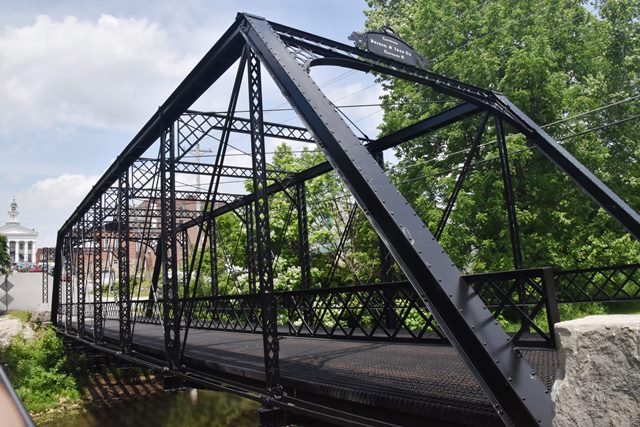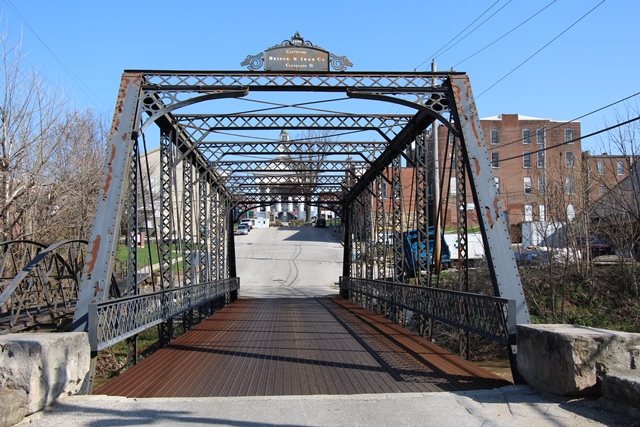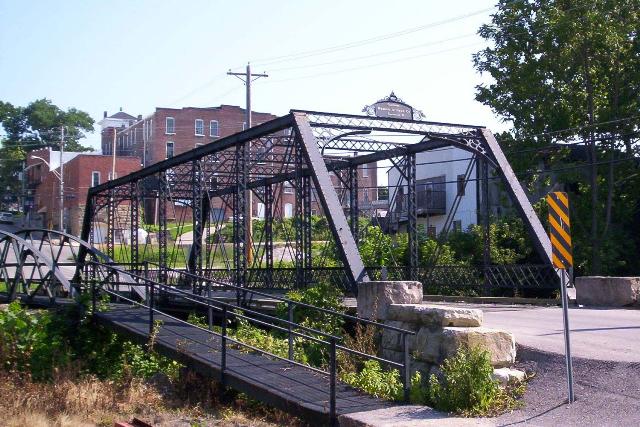We Recommend:
Bach Steel - Experts at historic truss bridge restoration.
BridgeHunter.com Phase 1 is released to the public! - Visit Now
Gospel Street Bridge
Orange County Bridge 200, Sol Strauss and James M. Tucker Memorial Bridge

Primary Photographer(s): Nathan Holth and Rick McOmber
Bridge Documented: July 2, 2007, April 4, 2015, and May 28, 2019
Paoli: Orange County, Indiana: United States
1880 By Builder/Contractor: Cleveland Bridge and Iron Company of Cleveland, Ohio
Not Available or Not Applicable
90.2 Feet (27.5 Meters)
93.0 Feet (28.3 Meters)
15.4 Feet (4.69 Meters)
1 Main Span(s)
5900102

View Information About HSR Ratings
Bridge Documentation
This eight panel structure is an old structure and it features highly decorative portal knee bracing, as well as a decorative builder plaque. It features latticed vertical members that are a bit different looking than the standard truss bridge. The bridge features unique arched, trussed floorbeams. Earlier pin-connected truss bridges such as this 1880 structure often featured uncommon design for some parts of the bridge. This was because designs had not yet become standardized, and some experimentation was still ongoing. The Gospel Street Bridge is important as a beautiful, and old metal truss bridge that retains good historic integrity.
Researching Cleveland bridge companies is difficult because between different companies with similar names, and also some companies changing their names, the various companies can become difficult to keep straight. This bridge was built by the company that had "And Iron" in its name. There were others, for example, the Cleveland Bridge Company is different than the Cleveland Bridge and Iron Company. In any case, this bridge is a rare surviving example of its builder.
The Gospel Street Bridge is located next to a separate pedestrian bridge that is itself old and worthy of attention. It appears to be a late bowstring truss bridge, perhaps built in the 1930s. It features riveted connections.
In late 2015, this bridge collapsed when a truck driver ignored the large "no truck" sign and drove over this bridge. Fortunately, the driver's insurance paid to have the bridge restored. Headache bars were also added after this incident. Overall the restoration did a good job of replicating the original design of members that had to be replaced, including the bridge's spectacular trussed floorbeams. However, somewhat unusually for Indiana, rivets were not used in the restoration. Instead an extremely unusual (for bridge work) type of bolt was used that appears to have had internal hex heads was used. To cover up the hex, it appears they attemted to pad weld over the hex to make them look like button head bolts (which are the traditional rivet substitute in bridge work). This is a very strange method, and given the labor involved probably exceeded that of driving genuine rivets, the purpose of this is unclear.
View Archived National Bridge Inventory Report - Has Additional Details and Evaluation

Above: Bridge in 2015 before truck collapsed the bridge.
Information and Findings From DHPA Historic Bridge SurveyStatement of Significance Hobson and Associates correctly identify this bridge as "a historic landmark", "a fine example of the first class construction and craftmanship of the last century with many features not common to bridge construction of the era." One of two surviving Pratts built by this noteworthy Ohio firm, the structure retains its original members including unique floor beams. Many of the bridge's decorative features are still intact; e.g., heavy and latticed struts and bracing, latticed portals and guardrails, and cast iron portal bracing. Architectural Description The
Cleveland Bridge and Iron Company of Cleveland, Ohio, fabricated this
single-span, pin-connected Pratt through truss which is seated upon cut
stone abutments and wingwalls. Intermediate verticals of laced channels
subdivide the 93'6" truss into most of its eight panels. The endpost
verticals are crafted from latticed Ts. Eyebars provide the diagonals:
pairs stretch toward center span from the top panel point to the bottom
of all except the endpost panels; cylindrical eyebars with turnbuckles
counter the others in the four most central panels. Double U-bolted to
the lower pins, special girder floor beams carry the timber deck with
its 14'6" roadway and 13'6" of vertical clearance. Instead of a solid
plate at the heart of the bow-shaped girders, angles and rectangular
strips form a central web. Bridge Considered Historic By Survey: Yes |
![]()
Photo Galleries and Videos: Gospel Street Bridge
2007 Bridge Photo-Documentation
A collection of overview and detail photos. This photo gallery contains a combination of Original Size photos and Mobile Optimized photos in a touch-friendly popup viewer.Alternatively, Browse Without Using Viewer
![]()
2015-2019 Bridge Photo-Documentation
Original / Full Size PhotosA collection of overview and detail photos. This gallery offers photos in the highest available resolution and file size in a touch-friendly popup viewer.
Alternatively, Browse Without Using Viewer
![]()
2015-2019 Bridge Photo-Documentation
Mobile Optimized PhotosA collection of overview and detail photos. This gallery features data-friendly, fast-loading photos in a touch-friendly popup viewer.
Alternatively, Browse Without Using Viewer
![]()
Maps and Links: Gospel Street Bridge
Coordinates (Latitude, Longitude):
Search For Additional Bridge Listings:
Bridgehunter.com: View listed bridges within 0.5 miles (0.8 kilometers) of this bridge.
Bridgehunter.com: View listed bridges within 10 miles (16 kilometers) of this bridge.
Additional Maps:
Google Streetview (If Available)
GeoHack (Additional Links and Coordinates)
Apple Maps (Via DuckDuckGo Search)
Apple Maps (Apple devices only)
Android: Open Location In Your Map or GPS App
Flickr Gallery (Find Nearby Photos)
Wikimedia Commons (Find Nearby Photos)
Directions Via Sygic For Android
Directions Via Sygic For iOS and Android Dolphin Browser
USGS National Map (United States Only)
Historical USGS Topo Maps (United States Only)
Historic Aerials (United States Only)
CalTopo Maps (United States Only)


